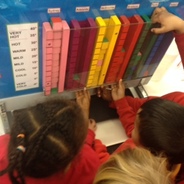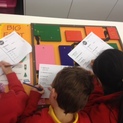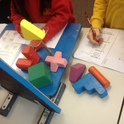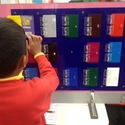Mathematics

At Rosanna Primary School, mathematics is a compulsory subject taught to all students from Prep through to Grade 6. The mathematics program at our school provides all students with the essential mathematical skills and knowledge that they will require going forward in their lives, in an ever-changing world. The Mathematics Curriculum incorporates the following strands of mathematics:
- Number & Algebra: counting, number patterns, place value, addition, subtraction, multiplication, division, fractions, decimals, money, patterns & algebra and mental strategies for computation
- Measurement & Geometry: shape, length, mass, time, temperature, area, perimeter, volume, capacity and angles
- Statistics & Probability: data representation and interpretation, graphing and chance & probability
At Rosanna Primary School, we believe that mathematics is incorporated into most parts of our daily lives. The teaching of mathematical skills related to purposeful and ‘real life’ activities helps children understand its relevance in their own lives.
The Early Numeracy Program approach is applied throughout the school at all levels. Typically mathematical lessons begin with a whole class focus. The children may then be part of small group teacher directed activities, independent activities or rotational activities. Groups are structured according to the teaching focus of the lesson and the children’s individual learning needs.
The Early Numeracy Program approach is applied throughout the school at all levels. Typically mathematical lessons begin with a whole class focus. The children may then be part of small group teacher directed activities, independent activities or rotational activities. Groups are structured according to the teaching focus of the lesson and the children’s individual learning needs.

Children are encouraged to verbalise their thinking. Sharing their learning and strategies during and at the end of a session is an excellent way for children to learn from each other and clarify their understandings.
Children work at a level that enables them to build on prior knowledge, challenge their thinking and make new connections. At all levels children are presented ‘real life’ mathematical problems enabling them to apply their mathematical skills and develop their problem solving strategies.
At all times and at all levels, a range of physical resources is available for children to use to support them in solving and demonstrating a mathematical problem. This equipment includes such things as counters, attribute blocks, clocks, rulers, calculators and relevant computer software.
Children work at a level that enables them to build on prior knowledge, challenge their thinking and make new connections. At all levels children are presented ‘real life’ mathematical problems enabling them to apply their mathematical skills and develop their problem solving strategies.
At all times and at all levels, a range of physical resources is available for children to use to support them in solving and demonstrating a mathematical problem. This equipment includes such things as counters, attribute blocks, clocks, rulers, calculators and relevant computer software.

Throughout the mathematics sessions teachers monitor and assess students' progress. Ongoing assessment informs teachers about the children's progress enabling them to adjust the teaching focus and allows for extension of students who are performing above grade level expectations and additional support for those who initially struggle with numerical concepts.
Parent involvement is encouraged during maths sessions, in particular when children are involved in ‘hands on’ sessions. At Rosanna Primary School, we welcome assistance in the classroom, where the teacher will guide and support parents when working with small groups or individual children.
Parent involvement is encouraged during maths sessions, in particular when children are involved in ‘hands on’ sessions. At Rosanna Primary School, we welcome assistance in the classroom, where the teacher will guide and support parents when working with small groups or individual children.

All students are provided with access to both netbooks and iPads throughout the school and these devices are used to support Numeracy programs. Students in the Prep Area have access to Rainforest Maths to develop their skills and knowledge and enrich the learning experiences within the classroom, whilst the Grade 1-6 students have access to the Mathletics Program. Mathletics enables students to enjoy maths and achieve outstanding results.
Each year, students in Grade 3 and 5 sit the NAPLAN (National Assessment Program –Literacy And Numeracy) tests. NAPLAN tests the sorts of skills that are essential for every child to progress through school and life, such as reading, writing, spelling and numeracy. The assessments are undertaken nationwide, every year, in the second full week in May.
Each year, students in Grade 3 and 5 sit the NAPLAN (National Assessment Program –Literacy And Numeracy) tests. NAPLAN tests the sorts of skills that are essential for every child to progress through school and life, such as reading, writing, spelling and numeracy. The assessments are undertaken nationwide, every year, in the second full week in May.

